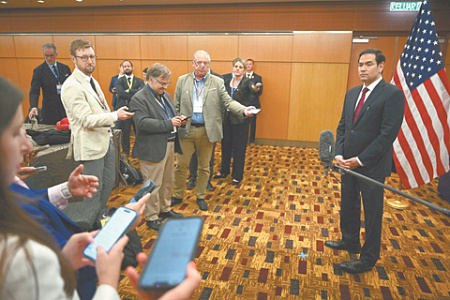
On the sidelines of the ASEAN foreign ministers’ conference in Kuala Lumpur, Russian Foreign Minister Sergey Lavrov and U.S. Secretary of State Marco Rubio held a critical meeting, injecting a new dynamic into strained bilateral relations. The talks occurred shortly after pointed remarks from President Donald Trump, who had voiced deep skepticism about his efforts to find a compromise with Vladimir Putin to end the Russia-Ukraine conflict. The meeting, however, signaled that the Kremlin remains open to dialogue, with the U.S. receiving a fresh set of Russian proposals that Secretary Rubio did not dismiss outright.
Following the hour-long discussion, Rubio intrigued reporters by revealing that Lavrov had presented new ideas for resolving the conflict in Ukraine. “I think it is a new and different approach,” Rubio stated, while cautiously adding, “Again, I wouldn’t characterize it as something that guarantees peace. We will share this idea with the President today.” This development suggests that despite recent frictions and Trump’s apparent pivot away from deal-making, a window for diplomacy may still exist.
The current climate is a stark contrast to earlier in the year when meetings in Saudi Arabia hinted at a burgeoning understanding between the Trump White House and the Kremlin. Trump’s recent statements, however, combined with renewed U.S. arms shipments to Kyiv, suggested a potential return to the policy of the previous Biden administration, which held that the conflict could only be resolved on the battlefield, demanding a full Russian withdrawal before any negotiations. Skepticism has been growing in Washington that Russia is merely using talks to stall for time while pursuing other geopolitical objectives.
Despite the new Russian overture, Secretary Rubio affirmed that U.S. military assistance to Ukraine would proceed “according to the schedule approved by Congress.” He clarified that a recent pause in the delivery of air defense systems, which had fueled speculation of a policy shift, was a “logical step” of a purely technical nature. This, he explained, was necessary to audit Pentagon arsenals following the defense of Israel and U.S. bases from Iranian attacks, an explanation that aligns with previous statements from the White House.
Beyond the U.S.-Russia focus, the ASEAN summit highlighted broader geopolitical rivalries in Southeast Asia. Chinese Foreign Minister Wang Yi made a significant move by confirming Beijing’s commitment to sign the Southeast Asia Nuclear-Weapon-Free Zone Treaty. The treaty, long championed by ASEAN, prohibits the stationing of nuclear weapons in the region. By agreeing to sign without reservation, China is positioning itself as a responsible partner and setting a diplomatic precedent for the other official nuclear powers.
This diplomatic maneuvering from Beijing underscores the competition for influence in the region. While China and Russia jointly advocate for a “multipolar world” to diminish Western dominance, Rubio, on his first trip to Southeast Asia as Secretary of State, is tasked with reinforcing the U.S. role as a security guarantor against Chinese expansion and Russian activities. The primary formal U.S. security commitment in the region remains its military pact with the Philippines, often marked by joint military exercises that draw criticism from Beijing.
However, for many ASEAN members, the most immediate threat is not military but economic. The Trump administration’s looming tariffs, set to take effect on August 1st, are a major source of anxiety. With steep duties of 25% on Malaysian imports, 32% on Indonesian goods, and even higher rates for other nations, this economic pressure risks alienating regional partners. As a result, many ASEAN countries are increasingly looking towards other major powers, including China, for economic stability, potentially undermining U.S. diplomatic efforts in the strategically vital region.
